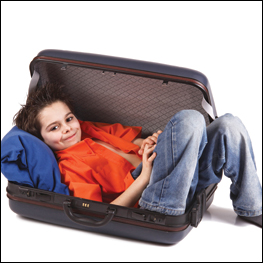Being away from home and loved ones causes feelings of homesickness in almost everyone. As many as 95 per cent of kids experience mild sadness, and some feel intense, long-lasting distress. Younger kids and those who have never spent time away from home have the most trouble at camp. You may be worried that your attempts to comfort your homesick child will only make the problem worse.
 “It’s important to differentiate between adjustment anxieties that tend to diminish as kids get accustomed to new places, people and routines, and deeper feelings of disconnection and depression that grow worse over time,” says Erika Myers, M.Ed., LPC, a therapist and former boarding school teacher.
“It’s important to differentiate between adjustment anxieties that tend to diminish as kids get accustomed to new places, people and routines, and deeper feelings of disconnection and depression that grow worse over time,” says Erika Myers, M.Ed., LPC, a therapist and former boarding school teacher.
Here’s how support your camper while they explore the world on their own:
Give kids control. Studies show kids who choose to go to camp are much less likely to feel homesick than kids who are forced to go because parents push. It’s best to let your child choose if, when and where they go to camp. Your child should also plan which activities they’ll do. Making decisions reminds kids they are capable and independent.
Set optimistic expectations. Kids need to know it is okay to think about home and to miss their parents, pets, toys and favorite foods. Explain that there will be a period of transition, but don’t be discouraging. Attitudes about separation can become a self-fulfilling prophecy - if your child believes they can’t cope with camp, they won’t. Be realistic and upbeat.
Lay low. Give your child time to navigate new situations without interference from home. “Kids need time and space to get immersed in the camp setting,” says Myers. Send a quick daily email (if the camp allows) or note that inspires your child to try new activities. Ask about their bunkmates and counselor. Keep at-home happenings on the down low so your child doesn’t miss what they’re missing even more.
Manage your own anxieties. You may be worried about your child’s ability to make friends and fit in. “Keep your concerns to yourself. Kids look to parents for their sense of self and safety,” says Frank J. Sileo, Ph.D., a psychologist and author of Bug Bites and Campfires: A Story for Kids About Homesickness. Talk with camp staff or other parents to quell your worries instead of passing them on to your child.
Encourage busy-ness. There is a lot going on at summer camp - staying busy is the best way to get through the initial adjustment. “Downtime will allow your child to dwell on thoughts of home and that will make him feel worse,” says Sileo. Get a list of camp activities and help your kid craft a plan of attack. The best defence against homesickness is a full calendar.
Stay in touch. If the camp allows, check in at regular intervals. “Setting up a ritual - perhaps a brief phone call or email at a specific time of day - can give your child a sense of security and consistency,” says Myers. Send a care package with treats and toys to let your camper know you’re thinking about them. Include items to share with cabin-mates. A book of Mad Libs or riddles makes bedtime fun for everyone.
Ask kids to write home. The process of putting thoughts on paper and mailing them away is cathartic. Send stationery and stamps so your child can handwrite letters to friends, parents and grandparents. Writing lets kids explore and express their feelings. Save kids’ letters to include in a summer camp scrapbook or memory box.
Don’t rush to the rescue. If you receive homesick letters or phone calls, express your confidence that your child can get through it. Offering to pick your child up will only validate their sense of helplessness, says Sileo. Identify an adult your child can talk to, such as a counselor or the camp nurse. Staff members are trained to handle homesickness and they’ll let you know if your child really needs to come home.
Tangible reminders of people and pets keep kids connected to home and family. Pack these items to comfort your camper:
While your child is away, plan a post-camp surprise party to welcome them back. Warm, loving parents give kids a firm foundation for big adventures at camp and beyond.
Heidi Smith Luedtke, Ph.D., is a personality psychologist and mom of two. She shares psychology lessons for real life at www.heidiluedtke.com/blog.
Calgary’s Child Magazine © 2024 Calgary’s Child